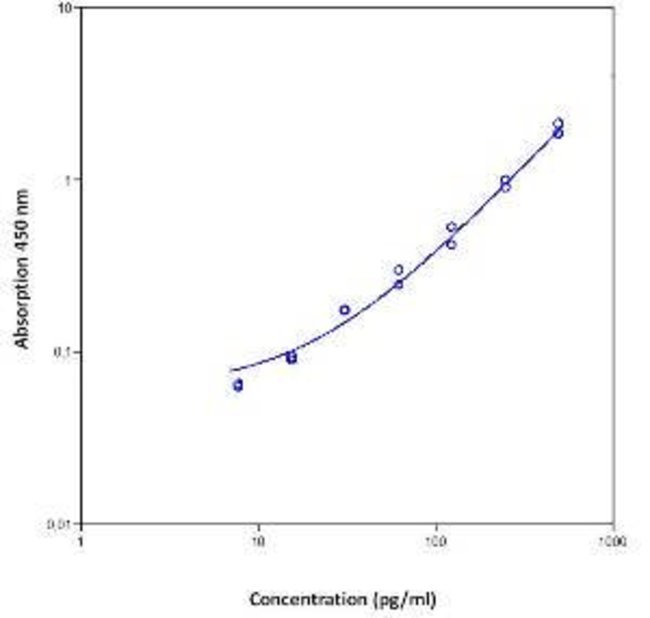MCP-1 Rat Instant ELISA Kit, Instant ELISA Kit, Each

|
|
Details:
The Rat Monocyte Chemoattractant Protein 1 (MCP-1) ELISA quantitates Rt MCP-1 in rat serum, plasma, cell culture supernatants,amniotic fluid or other body fluids. The assay will exclusively recognize both natural and recombinant Rt MCP-1. Principle of the method The Rat MCP-1 solid-phase sandwich ELISA (enzyme-linked immunosorbent assay) is designed to measure the amount of the target bound between a matched antibody pair. A target-specific antibody has been pre-coated in the wells of the supplied microplate. Samples or controls are then added into these wells and bind to the immobilized (capture) antibody. The sandwich is formed by the binding of the second (detector) antibody to the target on a different epitope from the capture antibody. An antibody conjugated with enzyme binds the formed sandwich. After incubation and washing steps to rid the microplate of unbound substances, a substrate solution is added that reacts with the enzyme-antibody-target complex to produce measurable signal. The intensity of this signal is directly proportional to the concentration of target present in the original specimen. Rigorous validation Each manufactured lot of this ELISA kit is quality tested for criteria such as sensitivity, specificity, precision, and lot-to-lot consistency. See manual for more information on validation.MCP-1 (Monocyte chemotactic protein-1, CCL2) has a predicted molecular weight of approximately 11kDa, however, it may run at a higher molecular weight due to glycosylation. MCP-1 is a member of the cytokine family and plays an important role in immunoregulation and inflammatory processes. MCP-1 signals through G protein-coupled receptors, CCR2 and CCR4, to recruit memory T cells, monocytes and dendritic cells. MCP-1 is linked with tumor progression, angiogenesis, and displays selective chemotactic activity towards monocytes and basophils but not neutrophils or eosinophils. MCP-1 is produced by a variety of cell types and is a potent chemoattractant for monocytes, memory T lymphocytes, and natural killer (NK) cells. Further, MCP-1 is indicated in the etiology of several immune disorders, and is upregulated during infection and inflammation. While MCP-1 is a potent basophil activator, the related protein MCP-2 stimulates both eosinophils and basophils. MCP-3 has been shown to have the broadest range of influence. MCP-1 has been implicated in the pathogenesis of diseases characterized by monocytic infiltrates, like psoriasis, rheumatoid arthritis or atherosclerosis.
Additional Information
| SKU | 1445886 |
|---|---|
| UOM | Each |
| UNSPSC | 41116158 |
| Manufacturer Part Number | BMS631INST |
